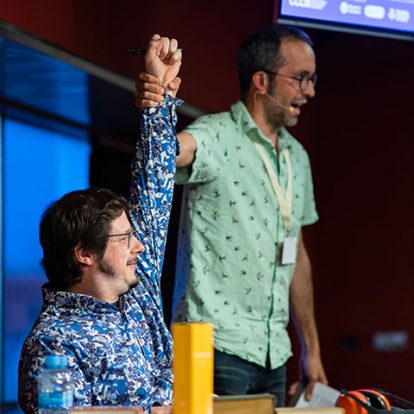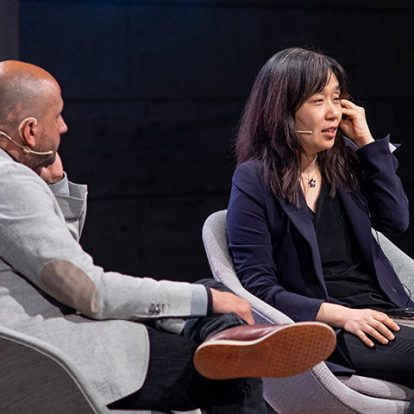The pleasure of reading: selected publications for a good summer
Kosmopolis
13 July 2018
With summer come the holidays – that time of year when we get to disconnect from our daily routine and, among other things, enjoy the pleasure of reading. You might have already decided on your summer reading list, but if not, here at Kosmopolis we’ve put together a list for you based on the recommendations of the people who work in the different departments of the CCCB.
It’s quite a varied selection, ranging from the most refreshing novels to works of non-fiction that will give you rich food for thought. We’ve included something for every reader and every taste. You’ll find short stories, novels on memory and remembrance, love stories and characters hard done by life, reflections on imagination, science and literature itself, and books for film lovers and globetrotters. Enjoy your reading. And enjoy your summer!
Rafael Chirbes, El año que nevó en Valencia (The Year that Snowed in Valencia)
I can recommend a fantastic book by Chirbes with a beautiful title – El año que nevó en Valencia – greatly refreshing for the hot summer months. It’s a very short novel about the memories of a child who, together with his widowed mother, pays a visit to the city of Valencia to celebrate the birthday of a relative. There is one phrase that made a particular impression on me: “El pasado es un alien que llevamos todos dentro, que engorda, que está ahí siempre a punto de reventarnos el pecho y escaper” (The past is an alien that we all carry inside of us, that grows, that’s always there ready to burst out our chests and escape).
(Mònica Muñoz, Press and Social Media Officer)
Ursula K. Le Guin, The Wave in the Mind: Talks and Essays on the Writer, the Reader, and the Imagination
I recommend it because of its apparent breeziness and its sense of humour. Also, because the author’s reflections on beauty, age, nature and politics stray from what is considered politically correct and from the opinions one is supposed to have nowadays. Which, apart from being a wise decision, I think is brave and surprising. Anyhow, in a nutshell, I want to recommend this book because after reading it, it becomes patently clear that nobody can survive without imagination…
(Susana Fernández, Advertising Manager)
André Aciman, Call Me By Your Name
The truth is I could recommend so many books for a good summer… But I think I’ll say Call Me By Your Name by André Aciman. The film has been very popular this year and I think it’s a story of young love that really celebrates summer, as well as the fact that it’s set in idyllic Italian countryside! It might be a rather sad novel, but it’s also beautiful.
(Rita Ondarra, intern in the Exhibitions area)
Kristine McKenna and David Lynch, Room to Dream
I’d recommend the recently published biography of David Lynch – Room to Dream. I still haven’t started it, but I’m sure that delving into the personality of such a powerful film-maker will be a good experience. What makes this different from other books on Lynch is that it’s made up of interviews with friends and family, and Lynch himself has also written parts.
(Marina Doña, Customer Services)
Nassim Nicholas Taleb, The Black Swan: The Impact of the Highly Improbable
The “black swan” theory deals with events which, by definition, are unpredictable and therefore highly improbably, but have a huge impact when they do occur; and how afterwards, the human mind needs to find a line of reasoning or narrative to justify their cause. This book shows us that our life is affected more by the outcome of “black swan”-type events than by pre-establish planning, and it talks about how the greatest opportunities are to be found in occurrences of this type.
(Iñaki Sainz, Head of Systems)
James Rhodes, Fire on All Sides
This is an honest book that talks about the problems that assail all of us in this crazy, frenetic and disturbed society in which we live, in a straightforward and sometimes amusing way. Rhodes uses anecdotes that help us put things into perspective, and even though it isn’t a self-help book, it helps you to carry on, with your head high, accepting that life and the world are not perfect – and neither are we humans. An ideal book for overcoming moments of stress, loneliness and even complicated family reunions.
(Marina Cisa, Digital Communication)
Clara Queraltó, El que pensen els alters (What others think)
One of the last books I read was El que pensen els altres, by the writer Clara Queraltó, which was awarded the Mercè Rodoreda 2017 prize. It’s a collection of short stories based around the daily experiences of characters who life hasn’t treated too kindly…
(Emili Maicas, Head of Maintenance)
Doris Lessing, The Diary of a Good Neighbour
As a member of the CCCB Alzheimer’s Programme, I can recommend The Diary of a Good Neighbour by Doris Lessing. During the novel, Lessing deals with themes such as our personal commitment to the society in which we live, intergenerational conflicts, loneliness and old age. The personal diary of the main character reveals natural emotions such as affection, the desire to protect others and anger towards a neighbour whose old age is described in a stark and uncompromising light. The story that it tells paints a far from idyllic picture of what it means to grow old in today’s society.
(Susana Garcia, Registration and Preservation Unit)
Three short books with a link
Cuántica (Quantic) by José Ignacio Latorre, because of the congenial way in which it introduces the reader to the world of quantum physics by using Italo Calvino’s Invisible Cities as a metaphor. This might then inspire you to dip into Six Memos for the Next Milenium, another book by Calvino which is, perhaps, one of the best exercises in envisaging the literature of the new century and its characteristics: levity, speed, preciseness, visibility and multiplicity. Attributes that César Aira manifests in his own particular way in a wonderful book entitled Continuación de ideas diversas (A continuation of diverse ideas) with brilliant passages such as this: “La superioridad de la literatura sobre las demás artes radica justamente en las demás artes. La literatura las incluye, trabaja con sus mecanismos, con las claves de sus mecanismos, los que las demás artes emplean a ciegas y la literatura expone en toda su belleza, en sus asimetrías, en su ingenio. Y no es de hoy, no es cosa de las experimentaciones de multimedia; siempre ha sido así” (The superiority of literature over the other arts lies precisely in the other arts. Literature includes them, it works with their underlying mechanisms, with the keys to their mechanisms, which other arts use blindly while literature reveals them in all their beauty, their asymmetry, their ingenuity. And it doesn’t just occur today, with the experiments in multimedia; it has always been this way.)
(Juan Insua, Director of the CCCB Lab and Kosmopolis)
Julian Barnes, The Sense of an Ending
This is a novel about memory and its pitfalls. We revisit the life of the main character, Tony Webster, who looks back on his experiences from his time at university to the present. What does he remember and what has he forgotten? As the narrative moves forward and the gap between the past and the present closes, the facts become clear, the truth rises to the surface and memory ceases to be a guarantee of anything.
(Cristina Fort, Social Networks Advisor)
Joan-Carles Mèlich, L’experiència de la pèrdua (Experiencing loss)
A poetic work of non-fiction on death, which focuses on the absence of the other and how this experience transforms those of us who remain and forces us to find new meaning in life. A reflection that conveys pain and love in equal measures, with such wise and hopeful lines as “el consol és la persuasió que, malgrat l’absència, val la pena continuar, que la vida encara és viva” (our consolation is the conviction that, despite this absence, it is worth carrying on, that life lives on).
(Quima Farré, Education Service)
Patricia Almarcegui, Conocer Irán (Discovering Iran)
A perfect book for discovering an area that is both wonderful and little-known – Central Asia. And if you’ve already been there, all the better! Almarcegui offers the perspective of a seasoned traveller who doesn’t fall prey to tourist clichés, but rather tries to understand the lives of the people and their culture. It’s not just a travel book, it’s an experience.
(Matty Betoret, Customer Service)









